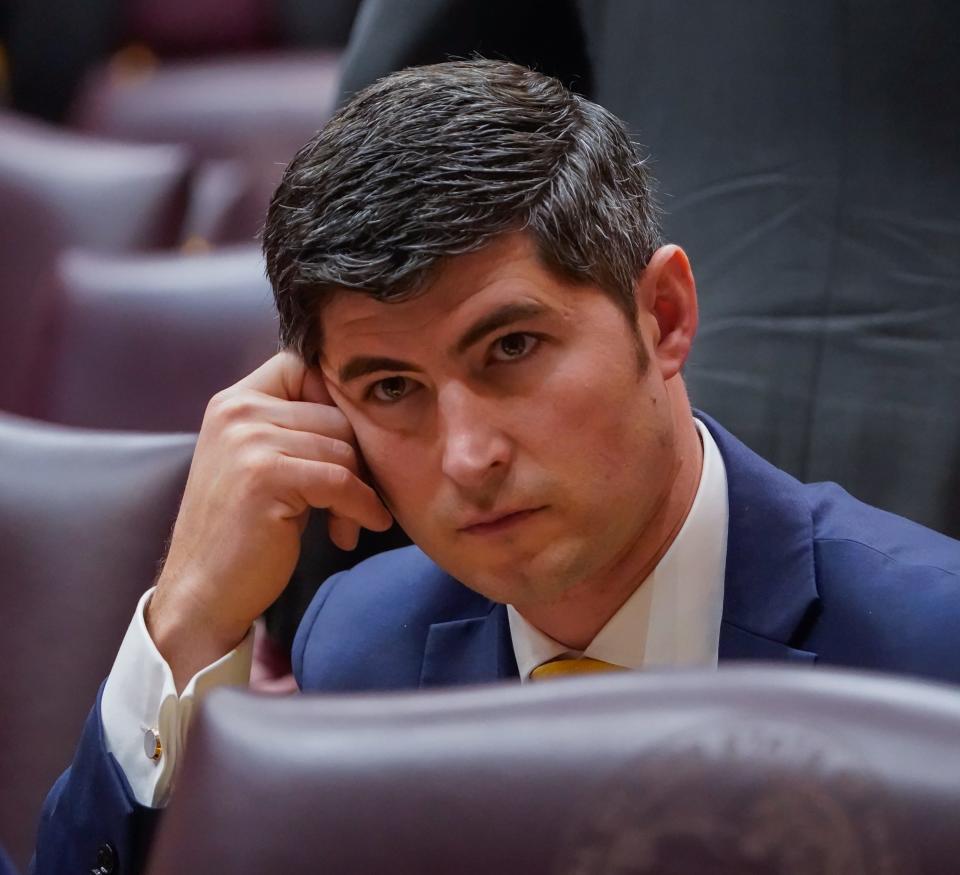Roundup: Elections bills moving through Indiana General Assembly that will impact voters
- Oops!Something went wrong.Please try again later.
Clarification: Only the Republican co-director of the Indiana Election Division supports House Bill 1264. The Democratic co-director does not.
Indiana lawmakers want to regulate digitally altered images in campaign ads, restrict when schools can put referendums on the ballot and require more address verification documents from first-time voters.
But the most contentious of voting-related bills this session is a proposal to require elections officials to compare voter rolls with the Bureau of Motor Vehicles' list of temporary credentials, which are given to non-citizens.
Here are the bills progressing through the legislative process this session that would impact Indiana elections. These bills have until Feb. 5 to pass the House.
House Bill 1264: Address verification and citizenship
Author: State Rep. Timothy Wesco, R-Osceola

What it does:
Gives the Secretary of State the ability to contract with a third party to compare the voter rolls to commercially available data, such as from a credit agency like Experian, to check for variations in voter addresses.
Requires voting officials to compare the voter rolls with the BMV's list of people who have temporary credentials, and notify counties of any matches. The idea here is to find noncitizens who registered to vote. That person would then have 30 days to provide proof of citizenship.
Require the state voter registration system to have a feature that flags nonresidential addresses such as a homeless shelter or business. County voting officials would then investigate these flagged addresses to determine whether a voter actually lives there.
Requires first-time voters registering in person to provide ID or bill proving their address, if they do not have a driver's license or the last four digits of their social security number.
Who supports it:
Two officials within the Secretary of State's office ― Brad King, the Republican co-director of the Indiana Election Division, and Dustin Renner, state election director ― say they support the bill, as do several county elections clerks who testified that they like the stronger address verification tools and the tools enabling them to clean up the existing voter rolls, rather than just screening new voters.
"In my belief, in my heart of hearts, Indiana’s elections are secure, but there’s always room for improvement," said Brad King, co-director of the Indiana Election Division.
Conservative think tanks like the Heritage Foundation also support this bill.
Who's opposed:
Immigration and civil rights advocates, including the ACLU of Indiana, see this as disenfranchising immigrant voters and people with nontraditional addresses, like the unhoused and college students.
Rachel Van Tyle, legal services director at Exodus Refugee Immigration in Indianapolis, said the 30-day requirement isn't feasible for many new citizens. It can take up to seven months to receive one's certificate of citizenship once a person turns 18, for example.
The Democratic co-director of the Indiana Election Division, Angie Nussmeyer, said she does not support the bill.
Status: House Bill 1264 passed the House 67-29 on Jan. 29. It now heads to the Senate.
House Bill 1376: School ballot referendums
Author: State Rep. Robert Behning, R-Indianapolis
What it does: Prohibits schools from putting referendum questions on the ballot during primary elections.
Who supports it: Behning argues that school referendums should be on the ballot only during general elections because voter turnout is higher.
"We’re asking as to whether they want to pay additional taxes; to me, it makes sense to make sure that we put it in an election cycle that most people participate in," he said.
Who's opposed:
The Indiana School Boards Association, Indiana Association of School Business Officials, Indiana Association of Public School Superintendents and the Indiana State Teachers Association are opposed.
They argue this takes away a tool districts have to respond nimbly to crisis situations, like needing money for urgent building repair or needing to restructure debt to keep a balanced budget.
Only a small handful of school districts are contained within a municipality and therefore have access to general election ballots every year; for the rest, this would restrict them to being able to issue referendums every two years.
Status: House Bill 1376 passed committee by an 8-5 vote, with one Republican joining Democrats in opposition. It's awaiting a final vote on the House floor.
House Bill 1133: Digitally altered images
Author: State Rep. Julie Olthoff, R-Crown Point
What it does: Requires makers of state and local election campaign media depicting a candidate, whether a TV ad or photograph, to add a disclaimer if the media was altered or artificially generated.
Status: House Bill 1133 passed out of committee and the House unanimously. It now heads to the Senate.
"We are talking about advanced technologies that are so good at transformations a reasonable person can't even tell that the images or recordings were doctored," Olthoff said.
Contact IndyStar state government and politics reporter Kayla Dwyer at kdwyer@indystar.com or follow her on Twitter @kayla_dwyer17.
This article originally appeared on Indianapolis Star: Indiana elections: These voting bills are progressing among lawmakers

